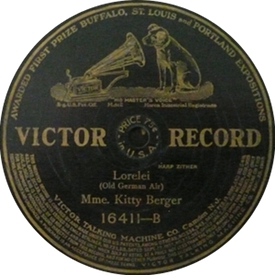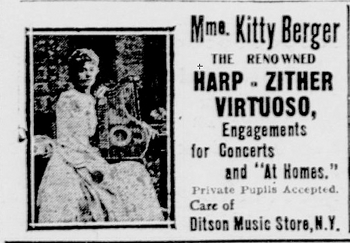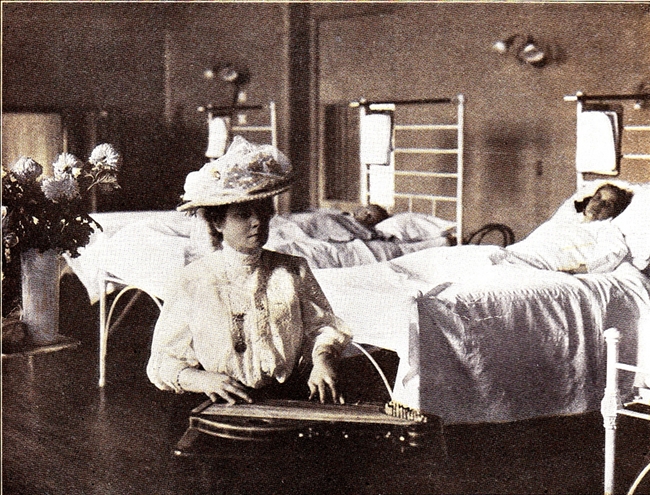In this article we explore the life of Kitty Berger, a zitherist from Austria and early recording artist with Victor and Edison records. After receiving notoriety in Europe for her musical abilities, she traveled to England and America with her zither. A recognized talent on the instrument of her homeland, she was invited to perform for heads of state in the White House and Windsor Castle.

On February 8, 1907, President Theodore Roosevelt, Mrs. Roosevelt and a group of distinguished guests settled in for a relaxing evening of entertainment. Some guests, such as Baron von Sternburg, the German Ambassador, and his wife, were treated to familiar sounds. For others, the experience would be altogether new.
This evening's entertainment at the White House was provided by the renowned zitherist, Kitty Berger. [1] Her program of twelve selections likely included works from her recorded repertoire. Her zither music, available on Victor and Edison records, included songs such as "Die Lorelei," "The Ring and the Rose" and "Believe Me, If All Those Endearing Young Charms." She is also known to have entertained audiences with selections by Felix Mendelssohn and Joseph Haydn on her zither.

President Roosevelt was reported to have been thoroughly impressed with the program of zither music and was especially pleased to learn that the zither, played upon so beautifully by Kitty Berger, was made here in the United States. The 43-stringed harp-zither model was made at the factory of Missouri's famed zither maker, Franz Schwarzer. She ordered the instrument while visiting the St. Louis World's Fair in 1904. Once completed, the Schwarzer harp-zither crossed the Atlantic and was received by her in London, England.
Austrian-born, Kitty Berger was recognized at an early age for her musical ability. As a youth, she travelled to England to perform and give zither lessons. In England, Kitty Berger's music elevated her to the highest social circles. She was friends with Adelina Patti, the celebrated opera singer. In Windsor Castle, Queen Victoria and members of the royal family were also charmed by the zither. Impressed, Queen Victoria presented her with a solitaire diamond. For her White House recital she wore this diamond, and a bracelet given to her by her friend Adelina Patti.
A long time resident of New York City, Kitty Berger travelled frequently and crossed the Atlantic on multiple occasions. In 1887 she returned from England where she had been staying at Craig Y Nos Castle in Wales, the home of Adelina Patti. In New York, she was frequently engaged to perform in private homes, restaurants and concert halls. In her spare time, she also offered zither lessons and would call on students in their homes to give lessons.
An article written in 1899 paints a picture of her demeanor. It reads, "In person Mme. Kitty Berger is tall, slender and very graceful, though slow of movement. Her manner is gentle, sweet and charming, though having a shadow of deep sadness over it. A great sorrow has left its indelible impress upon her face, but that very sorrow brings her art more into sympathy with those who hear her incomparable playing." [2] This perceived sorrow may have been the result of a personal tragedy experienced just a few years earlier. In 1896, while living in New York, her husband, Dr. Paul Pancritius, passed away unexpectedly, while in his mid-thirties. Originally from Königsberg, Prussia, Dr. Pancritius had been suffering from chronic pain due to an existing heart condition. As a doctor with access to morphine, he administered a fatal dosage of the drug in an attempt to self-medicate. [3]

New York Daily Tribune,
Sept. 25, 1909
Despite her loss, she carried on with her music and this was likely a source of comfort through the troubling period. She understood the healing power of music and in this manner she too was a physician of sorts. In Manhattan, she frequented hospitals hoping to ease the pain and lift the spirits of patients with her zither music. [4] She described her charity work as demanding but rewarding. At the end of a day's performance, she sometimes likened the weight of her zither to the burden of St. Christopher. However, as she brought comfort to those in need, she felt her load lighten.
In the coming years, with America's entry into World War I, the social atmosphere changed decidedly. All things German and many individuals of German ancestry came under increased scrutiny. As a matter of course, individuals were routinely reported by neighbors or other associations. The Bureau of Investigation (BOI) was very active in following up on these reports, many of which have been declassified and released into the public domain. Kitty Berger, now in her late forties, was not beyond suspicion and was also investigated by the BOI for alleged German activities. A line from her file reads, "Agent was informed by Police Officer Eduard O'Neill that this woman should be pur [sic] under investigation as he was certain she was very much pro-German." [5] For Kitty Berger, then living as a boarder in a home, the resulting inquiry revealed nothing of significance. It was reported that she "lived quietly and decently" but was having trouble making ends meet, had few callers and relied on others to receive her mail. Certainly this was in stark contrast to happier and more prosperous times.
In her final years, she continued to be involved with her charity work in New York, for which she was known as the "Hospital Angel." Along with performing in hospitals, she also held annual recitals to help support her charitable endeavors. Kitty Berger passed away of heart disease on April 22, 1925, at New York's Presbyterian Hospital. She was 54 years old. A gifted and selfless artist, she willingly shared her music with anyone who cared to listen. She was quoted as saying, "My harp-zither and my music belong to the public. For me, they should care nothing." As modest as she was, her unique contribution to America's musical heritage is certainly acknowledged.

Music's healing power. Kitty Berger performing in a New York Hospital, 1911.

[1] "President Entertains Friends At Recital of Zither Music by Mme. Berger in Blue Room", The Washington Times, February 9, 1907
[2] Olive Harper, "Queen of the Zither - Mme. Berger has pleased royalty with her music", The Evening Bulletin, January 3, 1899
[3] "A Doctor Dies From Morphine", New York Herald-Tribune, February 6, 1896
[4] Louise E. Dew, "The Hospital Angel", The World To-Day, February, 1911
[5] Federal Bureau of Investigation, "Madame Kitty Berger. Alleged German Activities", September 6, 1918
Do you have a story of historical interest pertaining to the zither that you would like to share? If so, email dave@zither.us or use the provided contact form.
